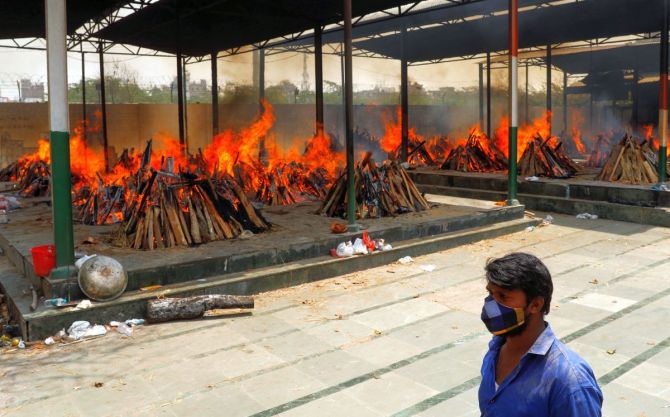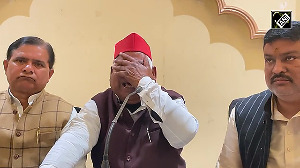The National Human Rights Commission has issued notices to all states and Union Territories asking them to reply within six weeks on the extent to which they can ensure dignity of the dead by formulating a policy at their end or by way of administrative orders and their strict implementation, officials said on Tuesday.

The report from them also must specify steps that are taken or proposed to be taken regarding the issuance of directives to the private hospitals for "not withholding the dead bodies for non-payment of medical bills by the family members of the deceased", the National Human Rights Commission said in a statement.
The NHRC said it has taken suo motu cognisance of the issues related to the cremation and undignified treatment of dead bodies as raised by Jitendra Singh Shunty, a member of its Core Group of Human Rights Defenders.
For more than 27 years, he has been involved in free cremation of unclaimed dead bodies and related services, it said.
The NHRC has issued notices to "all state governments and Union territories, through their chief secretaries, and sought responses within six weeks, to know the extent they can ensure dignity for the dead by formulating policy, if possible, at their end or by way of administrative orders and strict implementation thereof by empowering various local authorities" on a set of suggestions related to cremation of bodies.
Wood and other materials required for cremation of bodies should be provided free at all cremation grounds throughout India, at least for the poor and needy families, the NHRC has sought response on this suggestion, according to the statement.
Necessary orders or directions may please be issued to all private hospitals that they may not hold bodies hostage due to non-payment of medical bills by their families or for any other reason, the statement said.
Strict legal action should be taken against hospitals holding bodies hostage, the NHRC said, referring to another suggestion.
Cremation using CNG or electricity at electric cremation grounds should be free for poor people across India, and all hospitals should have mortuaries to prevent decomposition of bodies are some other suggestions on which the responses have been sought.
All government or private hospitals should be directed to provide free transportation of bodies to residences concerned, the statement said.
The report must also contain as to whether the states or UTs have taken steps about disseminating information, raising awareness, sensitisation, and training the staff dealing with the bodies in the humanitarian aspect with a view to tackling the situation of unclaimed dead bodies, the rights panel said.
The Commission has annexed with the notices its advisory on the 'Right to Dignity of Dead' issued during the COVID-19 pandemic to the authorities, officials said.
Issuing the notices, the Commission has observed that it is axiomatic that the right to dignity and fair treatment, under Article 21 of the Constitution, is not only available to the living man but also to his dead body.
"Civilisation, over the years, coupled with religion, tradition, and cultural practices has influenced the manner in which the dead bodies are being managed, both in times of war and peace. It is at the same time true that different communities and societies pay respect to the dead, through their respective religion and traditional practices and more so, through legal frameworks, whereby it is underlined that honour and respect for the dead body is a basic recognition of inherent human rights of dignity, which an individual possesses prior to his death," the statement said.
Undignified treatment and careless desecration of the dead body is highly condemnable by the societies at large and therefore, the importance that people place on body, reflects the humanitarian outlook of the society at its very core, it said.
The Commission has further observed that it is conscious of the fact that Article 130 of the Fourth Geneva Convention (International Humanitarian Law) states that the dead bodies must be honourably buried or cremated, appropriate to religious and cultural traditions of the person, if ascertainable.
The Geneva Convention was ratified by India in 1950, making it legally binding to provide for explicit provision relating to the dignified treatment and disposal of dead bodies, it added.
It becomes trite law that the right, encompassed or referred by Article 21 of the Constitution, cannot be waived, even on the death of a person, till the time, corpse has been disposed of in a dignified manner.
The issue became of seminal importance during COVID-19, when the dead bodies were not being touched; even families or relatives were not ready to perform funeral or burial; bodies were floated in rivers without cremation, and thus the Commission came up with an advisory 'Right to Dignity of Dead', the statement said.











 © 2025
© 2025